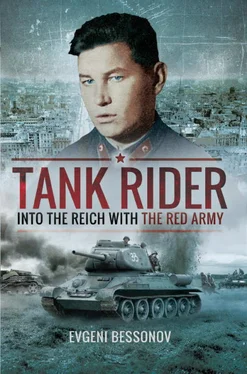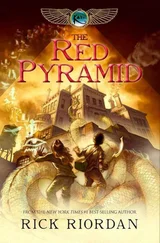So, Lieutenant Malyutin came up and took the pistol, which he had apparently never seen before, and started to study it. Without thinking he put the bullet in the cartridge chamber, pulled the trigger and a shot sounded. The bullet hit Guschenkov in the left shoulder and went right through the muscles. At first Petr did not even understand what had happened, until Alexander told him: ‘Pete, you wounded me.’ Malyutin was scared to death, but all worked out more or less well – he did not kill him, just wounded Alex in the left shoulder. Guschenkov was quickly bandaged and sent to hospital, but his misadventures did not end with that and he had to avoid a deadly danger once more: as he told us later, the Germans, some retreating unit, rushed into the village where the hospital was stationed. They suddenly burst into the house where the wounded were, rushed into the rooms and slaughtered everyone who was there. Alexander Guschenkov jumped from the window of the second floor and ran away into the wheat fields, firing back at the Germans with his Parabellum. He was lucky that it grew dark quickly after the attack. He got into the army hospital several days later. Unfortunately, this was not the only case when the Germans executed wounded and medical personnel. I think that there is no justification for such atrocities.
I also had a case when I wounded a fellow officer, a machine-gun platoon leader. It happened like this: our battalion attacked the Fritzes and almost threw them back from the road, when my soldiers reported: ‘Comrade Lieutenant, the Germans are attacking from the left!’ I did not have binoculars – they only frustrated me in battle, but after looking attentively, I indeed saw Fritzes with their give-away helmets with ‘little horns’ running to the left flank of my company. One of them was especially annoying – he kept hiding and popping up again from the wheat. For some reason I had a rifle, in fact, a German carbine. I did not think long, aimed, and as soon as he showed up, I fired. All of a sudden I heard horrible obscene curses from his direction. It turned out that this was a Russian, and he had found a German helmet in action and put it on for safety. I did not kill him, but had shot his nose through. He immediately threw away the German helmet, they bandaged him and sent into the rear, as someone wounded by a German bullet. What else could I do? Well, the bullet was indeed German. How can one put on German equipment during an offensive! One can use them in defence, but with certain caution.
On the day Guschenkov was wounded our column marched forward unharmed for half a day, not encountering the enemy. The air force was not there either. However, this did not last long – in the afternoon the enemy threw their air force against us again. Given the lack of fighter escort (we did not always have anti-aircraft guns in the column either) the Germans merely taunted us without any disturbance. They strafed low over the column, and we suffered losses both in tanks and personnel. Why were our fighters not in the air? I think the only reason was that our Brigade was far away from the fighter bases, and fighters had limited range capacity. With the mission to liberate Lvov, our Tank Army, including our 49th Mechanized Brigade were deep in the enemy’s rear, almost 100 kilometres ahead of the general army units, that mostly advanced on foot and were engaged in constant fighting with the Germans.
THE BATTLE FOR LVOV

On 19 July we spotted German defences in front of a village. The battalion dispersed and formed a line; our company deployed and advanced towards the village, to the left of the road, while the 3rd company under Senior Lieutenant Kostenko advanced to the right of the road. We had learnt lessons in the battles at Bobrka and the 2nd company remained in battalion commander’s reserve. In a ravine we encountered two men in Soviet uniform. They said that they were Il-2 pilots, shot down by German fighters during a ground attack mission at the outskirts of Lvov and were trying to get back to the Russian lines. They asked for food, we gave them bread and canned food and advanced in attacking line. The pilots told us that there were no Germans in the trenches, and they were right. However, there was a barbed wire fence in front of the trench – Bruno’s coil, as it was called. This was a roll of barbed wire one metre high and one metre wide. We tried to jump it over, but it did not work out. I ordered several rain capes to be put over it, and we crawled over them to the other side of the obstacle. It was nice that the enemy was absent, otherwise we would have been stuck in front of that obstacle.
We entered the village and the villagers emerged one by one out of their shelters. Some soldiers went into the houses and were given milk and white bread. They brought me some, but I did not drink the milk, just had a piece of bread. For some reason the kitchen had again fallen behind and we did not have any food from the evening of the previous day. When we left the village, none of us were hungry any more. After that village we marched both on foot and on tanks. The German air force did not leave us alone and thus we moved westwards in stages.
Twilight set in, the German air force finally departed and we could continue our march in a normal manner. Later in the evening I and my platoon reached some village, unfortunately, I no longer remember its name. Ahead of us, about one or two kilometres away, lay the city of Lvov. When I reported to the battalion commander, he permitted the soldiers to rest. He gave an order to me to advance on Lvov early in the morning of the next day. It must have been 20 July, 1944, my birthday – I was 21 years old.
Because of platoon leader Petr Shakulo’s light wound, I was put in charge of his platoon as well. Petr’s assistant platoon leader was Sergeant Savkin – a brave man, I knew him well from battles in Kamenets-Podolsk and had a great respect for him. Savkin was a reliable man, soldiers obeyed him and respected him. It was just us two officers that remained in the company.
I should say that only our 1st motor rifle battalion approached Lvov, or, rather, a company and the battalion HQ – Battalion Commander Kozienko, Political Officer Gerstein and Head of Staff Grigoriev, my platoon and Shakulo’s platoon (without Shakulo himself). The 3rd platoon with the company commander Chernyshov was left behind at some road crossing (platoon leader Gavrilov was wounded) in case the Fritzes appeared. Guschenkov was also wounded. The 2nd company (company commander Shtokolov) was also left as a guard at some hill. The 3rd company (under Kostenko) was left to assist the 16th Guards Mechanized Brigade, which was stuck in street fighting in the town of Peremyshlyany, south-east from Lvov. The 2nd and 3rd battalions of our Brigade were somewhere else, while the 56th Tank Regiment left our battalion, fulfilling other missions. Thus, the battalion commander ordered me to capture Lvov with two platoons, which had 30 to 35 men. A huge city and a handful of soldiers.
We approached Lvov from the south, not from the east; the enemy did not expect us there and there were almost no German troops in the area. To be honest, I was afraid to enter the city without armour support. I did not like to assault or advance without tanks. Tanks always meant additional courage for us and additional fear for the enemy. We supported each other in battle, especially in built-up areas and forests. It is hard to fight without tanks, as it is hard for them to fight without us, the tank riders. Both the tank crews and ourselves were used to this co-operation. Without tanks we felt like a naked person in the winter, I cannot find any better comparison. It is bad without armour.
Читать дальше














